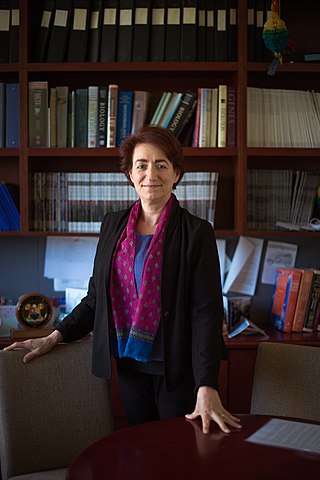Related Research Articles

The zebrafish is a freshwater fish belonging to the minnow family (Cyprinidae) of the order Cypriniformes. Native to India and South Asia, it is a popular aquarium fish, frequently sold under the trade name zebra danio. It is also found in private ponds.

Molecular genetics is a branch of biology that addresses how differences in the structures or expression of DNA molecules manifests as variation among organisms. Molecular genetics often applies an "investigative approach" to determine the structure and/or function of genes in an organism's genome using genetic screens.

The GloFish is a patented and trademarked brand of fluorescently colored genetically modified aquarium fish. They have been created from several different species of fish: zebrafish were the first GloFish available in pet stores, and recently the skirt tetra, tiger barbs, Rainbow Shark, Siamese fighting fish, and most recently Bronze corydoras have been added to the lineup. They are sold in many colors, trademarked as "Starfire Red", "Moonrise Pink", "Sunburst Orange", "Electric Green", "Cosmic Blue", and "Galactic Purple", although not all species are available in all colors. Although not originally developed for the ornamental fish trade, it is one of the first genetically modified animals to become publicly available. The rights to GloFish are owned by Spectrum Brands, Inc., which purchased GloFish from Yorktown Technologies, the original developer of GloFish, in May 2017.

The Zebrafish Information Network is an online biological database of information about the zebrafish. The zebrafish is a widely used model organism for genetic, genomic, and developmental studies, and ZFIN provides an integrated interface for querying and displaying the large volume of data generated by this research. To facilitate use of the zebrafish as a model of human biology, ZFIN links these data to corresponding information about other model organisms and to human disease databases. Abundant links to external sequence databases and to genome browsers are included. Gene product, gene expression, and phenotype data are annotated with terms from biomedical ontologies. ZFIN is based at the University of Oregon in the United States, with funding provided by the National Institutes of Health (NIH).
George Streisinger was an American molecular biologist and co-founder of the Institute of Molecular Biology at the University of Oregon. He was the first person to clone a vertebrate, cloning zebrafish in his University of Oregon laboratory. He also pioneered work in the genetics of the T-even bacterial viruses. In 1972, along with William Franklin Dove he was awarded a Guggenheim Fellowship award, and in 1975 he was selected as a member of the National Academy of Sciences, making him the second Oregonian to receive the distinction. The University of Oregon's Institute of Molecular Biology named their main building "Streisinger Hall" in his honor.
Philip William Ingham FRS, FMedSci, Hon. FRCP is a British geneticist, currently the Toh Kian Chui Distinguished Professor at the Lee Kong Chian School of Medicine, a partnership between Nanyang Technological University, Singapore and Imperial College, London. Previously, he was the inaugural Director of the Living Systems Institute at the University of Exeter, UK and prior to that was Vice Dean, Research at the Lee Kong Chian School of Medicine.

Alexander F. Schier is a Professor of Cell Biology and the Director of the Biozentrum University of Basel, Switzerland.

Marianne Bronner is a developmental biologist who currently serves as Edward B. Lewis Professor of Biology and an executive officer for Neurobiology at the California Institute of Technology. Her most notable work includes her research on the neural crest. Bronner's research focuses on studying the cellular events behind the migration, differentiation, and formation of neural crest cells. She currently directs her own laboratory at the California Institute of Technology called the Bronner Laboratory, and she has authored over 400 articles in her field.
Meng Anming is a Chinese developmental biologist. In 1983 he graduated from Southwest Agricultural University, and in November 1990 he received his PhD from the genetics department of the University of Nottingham. From 1990 to 1998 he served as an associate professor of Beijing Agricultural University, and from 1998 a professor of Tsinghua University. In 2007 he was elected a member of Chinese Academy of Sciences, and in 2008 a member of TWAS. In 2001 he was awarded the Ho Leung Ho Lee Foundation Prize for Scientific and Technologic Progress.
Lisa Steiner is a professor of immunology in the department of biology at the Massachusetts Institute of Technology. When she arrived at MIT in 1967, she was the first woman faculty member in the department. Her research focuses on the evolution and development of the immune system, using zebrafish as a model organism.
In Embryology a phylotypic stage or phylotypic period is a particular developmental stage or developmental period during mid-embryogenesis where embryos of related species within a phylum express the highest degree of morphological and molecular resemblance. Recent molecular studies in various plant and animal species were able to quantify the expression of genes covering crucial stages of embryo development and found that during the morphologically defined phylotypic period the evolutionary oldest genes, genes with similar temporal expression patterns, and genes under strongest purifying selection are most active throughout the phylotypic period.

Herwig Baier is a German neurobiologist with dual German and US-American citizenship. He is Director at the Max Planck Institute for Biological Intelligence and head of the department Genes – Circuits – Behavior. Herwig Baier's research aims to understand how animal brains convert sensory inputs into behavioral responses.

Hazel L. Sive is a South African-born biologist and educator. She is Dean of the College of Science, and Professor of Biology at Northeastern University. Sive is a research pioneer, award-winning educator and innovator in the higher education space who was elected as a Fellow of the American Association for the Advancement of Science in November 2021. Prior to June 2020, she was a Member of Whitehead Institute for Biomedical Research, Professor of Biology at Massachusetts Institute of Technology and Associate Member of the Broad Institute of MIT and Harvard. Sive studies development of the vertebrate embryo, and has made unique contributions to understanding how the face forms and how the brain develops its structure. Her lab also seeks to understand the origins of neurological and neurodevelopmental disorders, such as epilepsy, autism, Pitt–Hopkins syndrome and 16p11.2 deletion syndrome.

John H. Postlethwait is a professor of biology and author at University of Oregon.
Gerald "Gerry" Downes is an associate professor in biology at the University of Massachusetts, Amherst. His research expertise is in the genetic requirements for zebrafish swimming. Recently he has expanded his research interests into using the zebrafish system to model idiopathic epilepsy syndromes.
Ruth E. Ley is a British-American microbial ecologist. Ley was an associate professor in the Department of Microbiology and the Department of Molecular Biology and Genetics at Cornell University until 2018. She is currently serving as the director of the Microbiome Science Department at the Max Planck Institute for Biology.
Rachel Wong is an American neuroscientist who is a professor of Biological Structure at the University of Washington. She studies the developmental mechanisms that determine synaptic connectivity in the central nervous system. She was elected to the National Vision Research Institute of Australia in 2018 and the National Academy of Sciences in 2021.
Elizabeth Patton, Ph.D FRSE is professor of chemical genetics and group leader of Medical Research Council Institute for Genetics and Molecular Medicine (IGMM) Human Genetics Unit in Edinburgh, Personal Chair of Melanoma Genetics and Drug Discovery for a disease which kills 20,000 Europeans a year, and accounts for 80% of all skin cancer deaths. Her research into the genetic models and drug interactions testing, sharing international findings, is mainly using zebrafish in conjunction with the Edinburgh Cancer Research Centre. She holds a number of academic leadership roles in UK, Europe and international scientific bodies.
Carl-Philipp Heisenberg is a German developmental biologist specializing in embryology, cell biology, and biophysics. He is the grandson of the physicist Werner Heisenberg and nephew of biologist Martin Heisenberg. He was born in Munich, Germany.
Makoto Furutani-Seiki is a Japanese molecular biologist who is a Professor of Systems Biochemistry in the School of Medicine at Yamaguchi University, Japan.
References
- 1 2 3 "MGM John Rawls, PhD – Biography". mgm.duke.edu. Retrieved 2018-12-26.
- ↑ Rawls, John Franklin (2001). Genetic dissection of kit-dependent melanocyte development in zebrafish, Danio rerio (Thesis). OCLC 48789484.